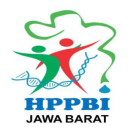Profile of Research Skills in the Integrated Guided Inquiry Model Research Skill Development (RSD) Framework
DOI:
https://doi.org/10.25134/quagga.v16i2.64Keywords:
Research Skills, RSD, Guided Inquiry, Descriptive methodAbstract
Research skills are one of the skills that exist in educational goals, research skills must be possessed to be able to face the 21st century. Research skills of students in Indonesia are still in the low category, this is evidenced by research that has been conducted by previous researchers with an average score -average 68.5 out of 100 points. This study aims to determine the research skill profile of students in one of the MAN schools in Sukabumi City. This study used a descriptive method, the subjects in this study were class XI students, totaling 22 students, determined by a sampling technique, namely purposive sampling. The instruments used were an attitude scale for research skills, and a Research Skill Development (RSD) assessment rubric. The results showed that students' research skill profiles were in the good category with an average score on the attitude scale of 83 ± 6.2% and on the practicum report 71 ± 8.5%. Therefore, it can be seen that the research skills profile of students using the guided inquiry learning model integrated with the Research Skill Development (RSD) Framework in this study is in the good category.
References
Anggraeni, N. Adisendjaja, Y. H. Amprasto, A. 2017. Profile of High School Students Understanding of Scientific Inquiry, Journal of Physics. Conference Series, 895 (1): 1-5. https://doi.org/10.1088/1742-6596/895/1/012138
Audu, C., Ajayi, V. O., & Angura, T. (2018). Do Guided and Structured Inquiry Instructional Strategies Have Any Comparative Effects on Students Achievement in Basic Science and Technology? A Field Report. SSRN Electronic Journal, 8(33), 81–89. https://doi.org/10.2139/ssrn.3069288
Blanchard, M. R. Southerland, S.A. Osborne, J.W. Dampson,V. D. Anetta, L. A. Granger, E. M. 2010. Is inquiry possible in light of accountability?: A Quantitative comparison of the relative effectiveness of guided inquiry and verification laboratory instruction. Science Education. 94 (4): 577–616. https://doi.org/10.1002/sce.20390
Budiningsih (2007) Belajar dan Pembelajaran. PT. Rineka Cipta.
Corebima, A. D. 2016. Pembelajaran Biologi di Indonesia Bukan untuk Hidup. Proceeding Biology Education Conference. Solo, Indonesia. Hal. 8–22.
Dekker, S. Van B. N. J. (2017). Guide for a project inquiry-based learning. Wetenschappelijke Doorbraken de Klas in! Molecuulbotsingen, Stress En Taal Der Zintuigen., 7–37.
Fakhriyah, F., Masfuah, S., Roysa, M., Rusilowati, A., & Rahayu, E. S. (2017). Student’s science literacy in the aspect of content science? Jurnal Pendidikan IPA Indonesia, 6(1), 81–87. https://doi.org/10.15294/jpii.v6i1.7245
Hamidah, A. Sari, E. N. Budianingsih, R. S. 2014. Persepsi Siswa tentang Kegiatan Praktikum Biologi di Laboratorium SMA Negeri Se-Kota Jambi. Jurnal Sainmatika. 8 (1): 49–59.
Haryati, S. Sukarno, S. Siswanto, S. Gumilar S. Muhlisin, A. 2020. Investigating existence of research skills in pre-service science teachers lesson plan document. Journal for the Education of Gifted Young Scientists. 8 (1): 183–196. http://dx.doi.org/10.17478/jegys.630703
Kapon, S. 2016. Doing research in school: Physics inquiry in the zone of proximal development. Journal of Research in Science Teaching. 53 (8): 1172–1197. https://doi.org/10.1002/tea.21325
Kuo, C. Y. Wu. H. K. Jen. T. H. Hsu. Y. S. 2015. Development and Validation of a Multimedia-based Assessment of Scientific Inquiry Abilities. International Journal of Science Education. 37 (14): 2326–2357. https://doi.org/10.1080/09500693.2015.1078521
Kusherawati, L. Windyariani, S. and Setiono. 2020. Profil sikap ilmiah siswa kelas VIII SMP melalui model pembelajaran guided inquiry laboratory experiment method (gilem). Biodik, 6 (2): 168–175. https://doi.org/10.22437/bio.v6i2.9307
Maknun, D. Gloria, R. Y. Muzakki, J. A. 2020. Keterampilan meneliti yang dimiliki mahasiswa prodi pendidikan biologi se-wilayah III Cirebon. Jurnal Inovasi Pendidikan IPA, 6 (1): 39 – 48. https://doi.org/10.21831/jipi.v6i1.28251
Mataniari, R. Willison, J. Hasibuan, M. H. E. Sulistyo, U. Dewi, F. 2020. Portraying students critical thinking skills through research skill development (RSD) framework: A case of a biology course in an Indonesian University. Journal of Turkish Science Education, 17 (2): 302–314. https://doi.org/10.36681/tused.2020.28
Rahmiati. 2013. Problematika Mahasiswa dalam Menulis Karya Ilmiah. Jurnal Adabiyah. 8 (2): 160–175.
Roito, E. Solihat, R. Wulan, A. R. 2019. Pencapaian Keterampilan Meneliti Abad Ke-21 Siswa SMA pada Pembelajaran Ekosistem melalui Step-By-Step Model Experiment (The Achievement of High School Students Research Skills for 21st Century. Assimilation: Indonesian Journal of Biology Education. 2 (1): 14–18. https://doi.org/10.17509/aijbe.v2i1.15112
Sari, D. P. Wulan, A. R. Solihat, R. 2019. Developing 21st century student research skills through assessment matrix and edmodo in biology project, Journal of Physics: Conference Series, 1157 (2): 1-5. https://doi.org/10.1088/1742-6596/1157/2/022093
Sari, P. Bennu, S. Mallo, B. 2014. Penerapan metode peemuan Terbimbing Berbantuan Alat Peraga Untuk Meningkatkan Hasil Belajar Siswa Kelas VIII Pada Materi Luas Permukaan dan Volume Limas di SMP Negeri 19 Palu. AKSIOMA Jurnal Pendidikan Matematika. 03 (02). 287–292.
Shanty, C. 2016. Peningkatan Minat Belajar Siswa Melalui Metode Praktikum Pada Materi Metabolisme di SMAN 3 Tangerang Selatan, Temu Ilmiah Nasional Guru (TING). 26 November 2016, Tangerang, Indonesia. Hal. 593–607.
Setiono. Rustaman, N. Y. Rahmat, A. Anggraeni, S. 2017. Implementasi Guided Inquiry Laboratorium Pada Praktikum Anatomi Tumbuhan, Utile Jurnal Kependidikan. 3 (2): 195–201. https://doi.org/10.37150/jut.v3i2.77
Subekti, H. Yuhanna, W. L. Susilo, H. Ibrohim. Suwono. H. 2018. Representation Of Mutual Terms And Research Skills Towards Grade Point Average: Exploration Study. Florea. 5 (1): 1–10. http://doi.org/10.25273/florea.v5i1.2500
Sugiyono (2016) Metode Penelitian Kuantitatif, Kualitatif, R&D. Bandung: PT. Alfabet.
Willison, J. O’Regan, K. 2007. Commonly known, commonly not known, totally unknown: a framework for students becoming researchers. Higher Education Research and Development. 26 (4): 393–409. https://doi.org/10.1080/07294360701658609
Yadav, B. Mishra, S. K. 2013. A Study of the Impact of Laboratory Approach on Achievement and Process Skills in Science among Is Standard Students. International Journal of Scientific and Research Publications, 3(1), 2250–3153.
Yuliati, D. I., Yulianti, D., & Khanafiyah, S. (2012). Pembelajaran Fisika Berbasis Hands on Activities Untuk Menumbuhkan Kemampuan Berpikir Kritis Dan Meningkatkan Hasil Belajar Siswa Smp. Jurnal Pendidikan Fisika Indonesia. 7(1), 23–27. https://doi.org/10.15294/jpfi.v7i1.1064
Downloads
Published
How to Cite
Issue
Section
License
Copyright (c) 2024 Quagga: Jurnal Pendidikan dan Biologi

This work is licensed under a Creative Commons Attribution-ShareAlike 4.0 International License.

















